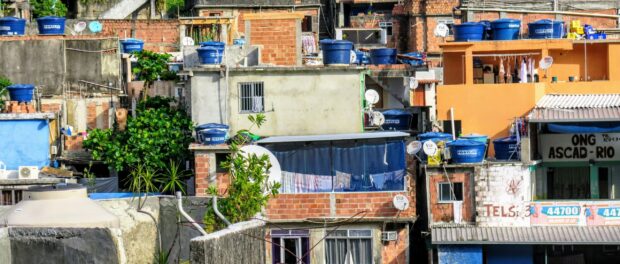
The following text is from a letter sent to Rio de Janeiro Governor Wilson Witzel by the Rocinha Residents’ Association and signed by representatives of many different favelas. Read all of our coverage on the new coronavirus and its impacts on Rio de Janeiro’s favelas here.
Proposals from Rio de Janeiro’s Favelas for the Governor of the State of Rio de Janeiro, Dr. Wilson Witzel as a Contribution to Combating the Pandemic Caused by Covid19/Coronavirus.
Rio de Janeiro, March 24, 2020
Considering the data estimates by the Brazilian Institute of Geography and Statistics (IBGE), the state of Rio de Janeiro reached 17.8 million inhabitants in 2018 with a total of over 1000 favelas spread over different municipalities.
With 765 favelas, the city of Rio de Janeiro’s favela population corresponds to nearly 2 million inhabitants in a municipality of 6 million people. In other words, 30% of the Carioca population lives in favelas.
17 proposals from the favelas for the Governor:
01 – Basic food baskets for all favela residents, especially families with children and elderly.
02 – Distribution of basic hygiene kits, including hand sanitizer and protective equipment, to families living in favelas.
03 – Guaranteed water distribution from state utility CEDAE in all favelas with priority attention to areas where there are water shortages.
04 – Resumption of Community Health Agents (Agentes Comunitários de Saúde) in the favelas where the state government provides basic health services.
05 – Guaranteed protection for all health workers in favelas with PPE (Personal Protective Equipment) kits; masks, gloves, and alcohol gel, and buy stock so there aren’t shortages at critical moments.
06 – Guaranteed attention for severe cases among favela residents by increasing the number of beds in the private and public networks as well as renting empty hotel (e.g. Hotel Intercontinental), motel, and guest rooms and as a last resort, even cruise ships. All regulated by the public authorities and in accordance with the need to combat coronavirus.
07 – Immediate suspension of all evictions, judicial or extrajudicial, in favelas.
08 – Guaranteed social rent support and an increase in the number of beneficiaries, clearing the current deficit immediately.
09 – Ban, indefinitely, evictions due to unpaid rent in the favelas.
10 – Exemption from electricity payments for all favelas indefinitely and that the services of Light S. A. are a priority in favelas for the next six months or as long as the pandemic lasts.
11 – Ban cutting energy, water and communications (telephone, Internet, etc.) connections for the next six months with subsequent negotiations concerning values owed, to be payed in installments over the course of 12 months. In case of disobedience on the part of utility companies, enforcement of a fine referring to the percentage of the monthly bill, which will be returned to the affected consumer and to strengthen the State Health budget.
12 – Temporary work suspension for all pregnant workers, nursing mothers and working mothers with children up to the age of 12 who live in favelas, with a guarantee of paid leave and job retention.
13 – Temporary work suspension for all public and private sector workers that belong to high-risk groups (those with high blood pressure, the elderly, those with diabetes, those suffering from chronic respiratory diseases) who live in favelas with paid leave and guaranteed job retention.
14 – Guaranteed housing assistance, food assistance, and basic income for informal market workers, the self-employed, small business owners/freelancers (MEI), domestic workers, day workers, and caretakers who live in favelas.
15 – Establish control mechanisms for the prices of basic food baskets and hygiene and health products located in favelas as well as easy access to essential products.
16 – Transparency and widespread disclosure of data and information about the health situation of the favela population provided by State bodies, the Oswaldo Cruz Foundation (Fiocruz), and municipalities.
17 – Postponement of state tax payments for establishments set up in favelas, such as small businesses, MEIs, and local merchants for a period of 6 months with future negotiations concerning repayments in installments over the course of 12 months without interest. Request that Brazil’s Federal Revenue postpone or defer the small and medium business tax (Sistema Integrado de Pagamento de Impostos e Contribuições das Microempresas e Empresas de Pequeno Porte, SIMPLES).
5 Suggestions for the Governor
Question: Where will the resources come from to pay for these services for the favelas so as to truly ensure our ability to combat the pandemic and attend to the most vulnerable population?
Reply: 01 – Suspend interest payments and debt repayments with banks for 6 months.
02 – Postpone payments on property by large land owners rented or leased by the state for 6 months.
03 – Defend, together with the federal government, the suspension of all the limits and sanctions of the Law of Fiscal Responsibility (LRF) to allow the State to buy more necessary inputs for the Secretary of Health for combatting the pandemic or declare a state of emergency in the state of Rio de Janeiro, suspending the limits and sanctions of the LRF.
04 – Increase expenditures with health policies by means of extraordinary additional credit or credit operations in accordance with the need to combat the pandemic in the state and especially in the favelas with priority attention to the most vulnerable.
05 – Join forces to repeal the 95th Constitutional Amendment (Emenda Constitucional 95) which institutes a ceiling on public spending, thus assuring more resources for the Unified Health System (SUS) in the fight against coronavirus.
Sincerely,
The Residents’ Association of Rocinha and other favelas

